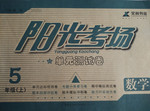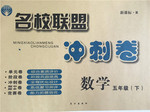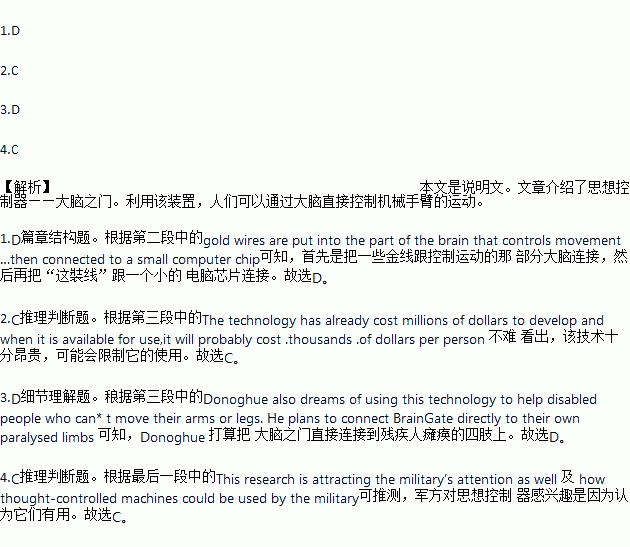题目内容
Imagine looking at something and being able to move it just by using your brain!That is exactly what the new technology called BrainGate can do —with the help of a robotic arm,anyway.
BrainGate is the idea of Professor John Donoghue and his team of researchers at the Brown Institute for Brain Science,USA. BrainGate is attached directly to the brain. First of all,gold wires are put into the part of the brain that controls movement. These are then connected to a small computer chip(芯片) . When the person thinks about different movements,this creates electrical signals,which are picked up by the chip. After this,the signals that are created by the brain are sent back to a computer,which changes the signals into movements. Finally,the computer uses the robotic arm to carry out these movements. BrainGate can already be used to write an e-mail or play computer games,just by brain power.
The technology has already cost millions of dollars to develop and when it is available for use,it will probably cost thousands of dollars per person. There are still many challenges ahead for Donoghue and his team. They are currently planning a mini wireless version,which will allow people to be connected to the computer at all times. Donoghue also dreams of using this technology to help disabled people who can't move their arms or legs. He plans to connect BrainGate directly to their own paralysed limbs(瘫痪的胳膊或腿) .This will mean that the person can control their own body again,without relying on a robotic arm.
This research is attracting the military's (军方的) attention as well. However,it is easy to understand why scientists might be concerned about how thought-controlled machines could be used by the military.
1.What does the underlined word “These” refer to?
A. Movements. B. Thoughts.
C. Brains D. Wires.
2.What is one of BrainGate's disadvantages?
A. It needs improvement. B. It produces few movements.
C. It is too expensive. D. It is difficult to control.
3.How will Donoghue help disabled people?
A. By developing a wireless version.
B. By replacing their limbs with robotic ones.
C. By making BrainGate smaller.
D. By attaching BrainGate to their bad limbs.
4.What does the military think of thought-controlled machines?
A. They could lead to disasters. B. They would face fierce competition.
C. They could be useful. D. They would be in mass production.
 阳光考场单元测试卷系列答案
阳光考场单元测试卷系列答案 名校联盟冲刺卷系列答案
名校联盟冲刺卷系列答案 名校提分一卷通系列答案
名校提分一卷通系列答案 课程达标测试卷闯关100分系列答案
课程达标测试卷闯关100分系列答案
